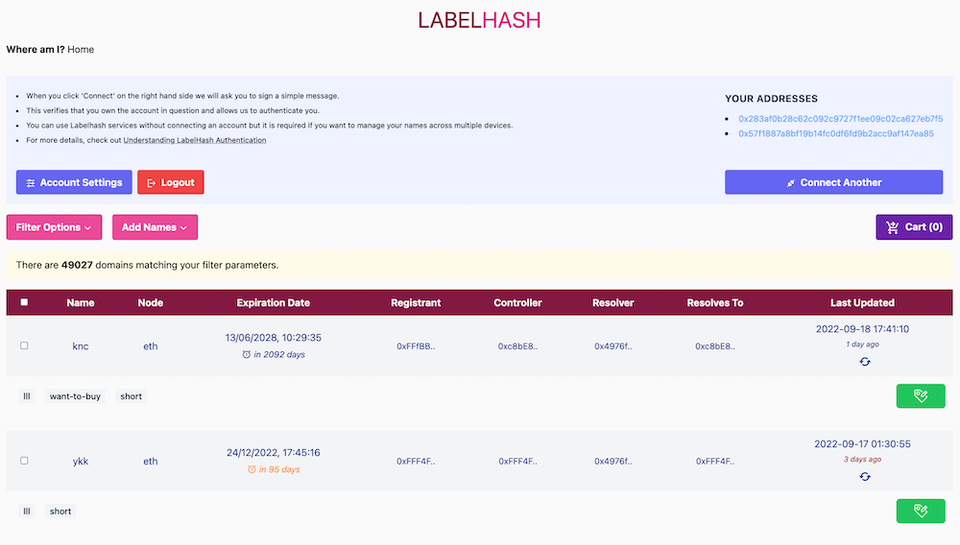Welcome to LabelHash.com

LabelHash.com is a domain management and research tool for the Ethereum Name Service (ENS).
LabelHash started life as a project for a single entity - they wanted a platform to help them purchase and manage their domain names. We onboarded a few more clients, and they liked it.. a lot. We had a chat, and came to the conclusion that we could (and should) offer the product to the public.

What we offer?
Lots.
Tags
We offer a flexible tool for researching ENS domain names, and managing registrations. Our tagging system allows you complete control to organise the names in your account as you wish.
You can:
- Monitor domain names that you have registered across any number of addresses.
- Monitor the domains that specific addresses (or combinations of addresses) are registering.
- Find out which 3 letter word names are available on OpenSea for less than 3 ETH, are owned by 0xcool and have the tags 'cool' and 'want'.
- etc etc
Filters
Our extensive filter options allow you to drill down into the domain names into your account based on all manner of criteria:
- name
- domain length
- expiration date,
- for sale status
- owner, controller, resolver, or resolves to address
- etc etc
Notifications
You can setup notifications to:
- receive emails when specific names are available for registration/purchase at specific prices.
- receive emails when specific name are going to expire.
For more details check out: How to get notifications when an ENS name is expiring.

Bulk registration and renewal
You can register and/or renew (in bulk) any number of domain names.
We add no additional fees. You pay the registration/renewal fees (as dictated by the ENS smart contracts), and nothing more.
Here are some guides:
- Registering Ethereum Name Service (ENS) domains using LabelHash
- Renewing Ethereum Name Service (ENS) domains using LabelHash

Guides
web3 is complex. Smart Contracts are a whole new metaphorical world. Scams are pervasive in the web3 ecosystem because interacting with smart contracts is a little more technical than what we are used to in the web2 world.
During the process of building LabelHash I was asked on numerous occasions 'How does this work?', 'What does this do behind the scenes?' etc
I figured it would be nice to document how the site works in a series of guides that you'll be able to find on this blog.
There is not an abundance of content right now, but I am hoping to build out the LabelHash blog across two core categories:
- ENS Explainers - Articles outlining core Ethereum Name Service concepts
- Inside LabelHash - Articles outlining how LabelHash works, and how it interacts with the ENS smart contracts.
In addition to those categories there are a number of posts detailing how one can get started using LabelHash.
Who are we?
I'm Thomas. I built the majority of the LabelHash offering with the help of a number of freelancers friends who I have had the pleasure of working with over the years.
I'm a software guy with an extensive background in domain names. I helped build DomainNameSales.com/Uniregistry back in the day, have bought and sold domain names (for myself and others), and have worked with a number of corporate clients (in domain name related activities) as a consultant.
I've been involved in the ENS ecosystem for years. Back in 2017 I built out ETHTools.com (and its sister product ENSTools.com). We built out tooling for the original ENS Vickrey auctions (throwback Thursday). Unfortunately I didn't have the foresight to register loads of them myself :/
I have a degree in Economics (and actually wrote my dissertation on the Economics of Domain Names), and have a particular interest in behavioural economics. It's of no surprise that ENS interests me.
Feedback
I am always open to constructive feedback. Feel free to contact us on Twitter, or via email (feedback [at] labelhash [dot] com).
I am a firm believer in transparency, and like to maintain a public roadmap of feature development. That said, (as mentioned) the product has been built to a core specification for a specific use case - research tooling and management.